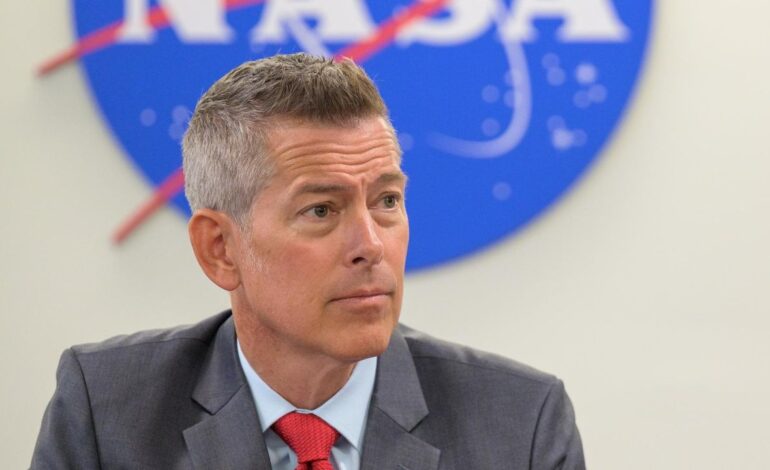NASA’s Duffy Declares Commitment to Win Moon Race Against China

NASA’s acting administrator, Sean Duffy, has firmly rejected suggestions that the United States is falling behind China in the renewed competition to return humans to the moon. Speaking at an internal town hall meeting on September 4, 2023, Duffy responded to Senate testimony from the previous day that indicated the possibility of China landing astronauts on the lunar south pole before the U.S. “I’ll be damned if that is the story that we write,” Duffy stated emphatically, pledging that NASA would “beat the Chinese to the moon, safely, quickly, and correctly.”
Duffy’s comments followed a Senate Commerce Committee hearing titled “There’s a Bad Moon on the Rise,” during which former NASA Administrator Jim Bridenstine and former associate administrator Mike Gold expressed concerns that China’s lunar ambitions could surpass those of the U.S. The hearing highlighted the urgency of NASA’s Artemis program, which aims to return astronauts to the moon as a stepping stone for future missions to Mars.
The upcoming Artemis 2 mission is set to be NASA’s first crewed flight of the Orion spacecraft, scheduled for launch no earlier than February 2026. This mission will mark the first time humans have visited the moon since the Apollo missions ended in 1972. Astronauts Reid Wiseman, Christina Koch, and Victor Glover, along with Canadian Space Agency astronaut Jeremy Hansen, will embark on a lunar flyby before returning to Earth.
Plans for Artemis 3, which aims to land astronauts on the moon’s south pole, are targeted for a 2027 launch. However, uncertainties surrounding the timeline raise questions about whether NASA will meet this ambitious goal. Duffy acknowledged concerns raised during the Senate hearing, where Bridenstine noted the likelihood of China achieving a lunar landing before the U.S. This sentiment was echoed by Gold, who warned that China’s success could reshape global dynamics, affecting the U.S. economy, innovation capabilities, and national security.
During the town hall, Duffy emphasized that the Trump administration remains supportive of the Artemis program, despite broader budgetary constraints affecting NASA. He indicated that while the fiscal year 2026 budget request proposed a significant cut of 24% to NASA’s overall budget, there is a commitment to fund Artemis fully. Duffy remarked, “If I bring up NASA… the President’s eyes light up,” underscoring the administration’s focus on the program.
In a historical context, President Trump has framed the U.S. lunar ambitions as part of a “manifest destiny to the stars.” Although this phrase carries controversial connotations associated with 19th-century U.S. expansionism, Duffy reiterated its significance in promoting space exploration.
As NASA navigates budgetary challenges, the agency’s workforce has raised concerns over impending project cuts and layoffs, with nearly 4,000 employees expected to exit due to the “deferred resignation program.” Despite these difficulties, Duffy expressed confidence in the agency’s ability to fulfill its mission, stating, “I think we have enough money to accomplish our mission.”
Duffy pointed to the need for cost reductions, noting that current launch expenses for the Space Launch System (SLS) stand at around $4 billion per launch, which could hinder the long-term viability of the moon program. In a call for action, he stated, “If we don’t, I’ll ask for more,” showing his commitment to securing necessary resources.
Accompanying Duffy at the town hall, recently appointed NASA Associate Administrator Amit Kshatriya emphasized the importance of public service and accountability. Kshatriya urged the agency to focus its efforts on supporting Artemis, Mars, and scientific endeavors that enable human exploration. He challenged employees to adopt a proactive mindset, saying, “We want you to have the black pen, not the red pen.”
Kshatriya’s remarks were designed to shift NASA’s internal culture towards action rather than analysis, underscoring the urgent need for progress. “Sometimes we can let safety be the enemy of making progress,” Duffy added, advocating for calculated risks in pursuit of their goals.
In conclusion, Duffy’s statements reflect a renewed determination within NASA to reclaim its position in the space race, reaffirming a commitment to a future of human exploration beyond Earth. “We are not going to let this storied history of NASA be written that we lost the second space race,” he told employees, rallying support for the agency’s mission in the face of growing international competition.






